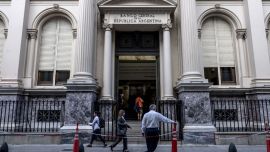Fitch Ratings had the last word when they downgraded Argentina into the junk territory of ‘CCC’ from ‘B’ in the light of “a substantial risk of default” (accompanied by a milder demotion from ‘B’ to ‘B-’ from Standard & Poor’s).
The markets wasted no time following President Mauricio Macri’s shock defeat in Sunday’s PASO primaries – Banco Nación started the week by rapidly dumping the peso to 61 per dollar from the previous Friday’s closing figure of 46.55 after an initial 53 pesos with some banks demanding over 65 in the course of the day.
But the stock market was the scene of Black Monday’s most dramatic collapse – the Merval share benchmark index plunged 38 percent with some banks and energy companies almost 60 percent down. An artificial surge of eight percent the previous Friday on the back of falsely optimistic opinion polls largely accounted for the difference with a currency devaluation of around 30 percent. The plunge was reported by Bloomberg as the second-biggest drop anywhere in the world in the past seven decades (Sri Lanka, engulfed in Civil War in 1989, holds the record).
When pushing up already high interest rates 10 points to record levels of nearly 75 percent failed to do the trick, the Central Bank shed US$105 million from its ample reserves in a bid to limit the damage and Banco Nación closed the day at 57.30 pesos.
Meanwhile, frenzied credit-default swap trading had already started amid estimates that the probability of Argentina suspending debt payments over the next five years was around 75 percent. Government dollar bonds lost about 25 percent on average on Monday, pushing prices to a range of 55-60 cents with yields spiking to as high as 35 percent on short-term notes.
In the wake of the investor stampede to dump Argentine stocks, bonds and currency, bad turned to worse on Tuesday as far as country risk at least was concerned, soaring from 904 to 1,653 points (almost identical to yesterday’s close). But the peso rebounded slightly that day with the price per dollar dipping from 57.30 to 55 pesos before closing slightly up on 58 while stocks recovered some eight percent from Monday’s record slump.
Nevertheless, the estimated probability of default crept up towards 80 percent with only Venezuela topping the spread of Argentine over US Treasury bonds.
Midweek saw the crisis peak for now (although the situation remains highly precarious) with country risk hitting 1,741 points on Wednesday and the peso weakening to 63 per dollar at Banco Nación. In a frantic bid to stop the rot the Central Bank doubled its dollar sales to over half a billion from the almost quarter billion shed in the first two days of the week while Wednesday also saw the Treasury sell US$60 million. Early that morning Macri had announced pay hikes, subsidy increases and tax cuts (including a higher income tax floor) in a bid to regain voters, also announcing a 90-day freeze on fuel prices which he failed to run by the oil companies.
These measures failed to turn the corner on the crisis. What did restore some calm were the telephone contacts later that day between Macri and the PASO’s runaway Peronist victor Alberto Fernández, which the markets interpreted as a truce of sorts with the Frente de Todos candidate reiterating his disavowals of default.
Early that morning Macri had announced pay hikes, subsidy increases and tax cuts (including a higher income tax floor) in a bid to regain voters, also announcing a 90-day freeze on fuel prices which he failed to run by the oil companies.
These measures failed to turn the corner on the crisis. What did restore some calm were the telephone contacts later that day between Macri and the PASO’s runaway Peronist victor Alberto Fernández, which the markets interpreted as a truce of sorts with the Frente de Todos candidate reiterating his disavowals of default.
The exchange rate rebound was not only
the result of a smoother political climate
– the Central Bank changed its rules on
foreign currency holdings, effectively forcing some banks to sell dollars.related news





















Comments